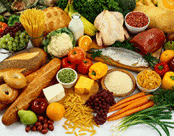NUTRITION
 Eating
healthy has never been easier than it is today, but it has also never
been more difficult. Thanks to innovations in technology and transportation,
fresh fruits and vegetables are available year-round. Leaner meats and
meat alternatives are easily accessible. Manufacturers offer reduced-fat,
reduced-sugar, and reduced-sodium products for almost any meal, snack,
or dessert. Even fast-food restaurants and convenience stores carry
food items that are lower in fat and higher in nutritional value. Eating
healthy has never been easier than it is today, but it has also never
been more difficult. Thanks to innovations in technology and transportation,
fresh fruits and vegetables are available year-round. Leaner meats and
meat alternatives are easily accessible. Manufacturers offer reduced-fat,
reduced-sugar, and reduced-sodium products for almost any meal, snack,
or dessert. Even fast-food restaurants and convenience stores carry
food items that are lower in fat and higher in nutritional value.
WEIGHT MANAGEMENT
 Many
view a healthy lifestyle as something difficult to attain--and something
that's not much fun. Traditional diets have taught us that to lose weight,
we must count calories, keep track of everything we eat, and deprive
ourselves by limiting the amount--and kinds--of foods we eat. Diets
tell us exactly what and how much food to eat, regardless of our preferences
and individual relationships with hunger and satiety. Dieting can help
us lose weight (fat, muscle, and water) in the short term but is so
unnatural and so unrealistic that it can never become a lifestyle that
we can live with, let alone enjoy! While very few diets teach healthy
low-fat shopping, cooking, and dining-out strategies, many offer unrealistic
recommendations and encourage health-threatening restrictions. Even
more important, diets don't teach us the safest, most effective ways
to exercise; they don't teach us how to deal with our cravings and our
desires, or how to attend to our feelings of hunger and fullness. Eventually,
we become tired of the complexity, the hunger, the lack of flavor, the
lack of flexibility, the lack of energy, and the feeling of deprivation.
We quit our diets and gain back the weight we've lost; sometimes we
gain even more! Many
view a healthy lifestyle as something difficult to attain--and something
that's not much fun. Traditional diets have taught us that to lose weight,
we must count calories, keep track of everything we eat, and deprive
ourselves by limiting the amount--and kinds--of foods we eat. Diets
tell us exactly what and how much food to eat, regardless of our preferences
and individual relationships with hunger and satiety. Dieting can help
us lose weight (fat, muscle, and water) in the short term but is so
unnatural and so unrealistic that it can never become a lifestyle that
we can live with, let alone enjoy! While very few diets teach healthy
low-fat shopping, cooking, and dining-out strategies, many offer unrealistic
recommendations and encourage health-threatening restrictions. Even
more important, diets don't teach us the safest, most effective ways
to exercise; they don't teach us how to deal with our cravings and our
desires, or how to attend to our feelings of hunger and fullness. Eventually,
we become tired of the complexity, the hunger, the lack of flavor, the
lack of flexibility, the lack of energy, and the feeling of deprivation.
We quit our diets and gain back the weight we've lost; sometimes we
gain even more!
NUTRITION AND TRAINING
Good
nutrition can make its greatest impact by helping you to recover between
training sessions. Improvements in performance are primarily the result
of your body's adaptation to the stress of intensive training. With
consistent training comes adaptation, with adaptation comes improvement.
So it is important that you pay attention to your eating habits 365
days of the year and not just on training days. One of the prime considerations
is that your diet meets the demands placed upon your body by training.
In particular, you must consume sufficient energy in the form of carbohydrates
to maintain the stores of energy within the muscles. Low carbohydrates
intakes while you are training hard can only result in low muscle glycogen
stores.
|

